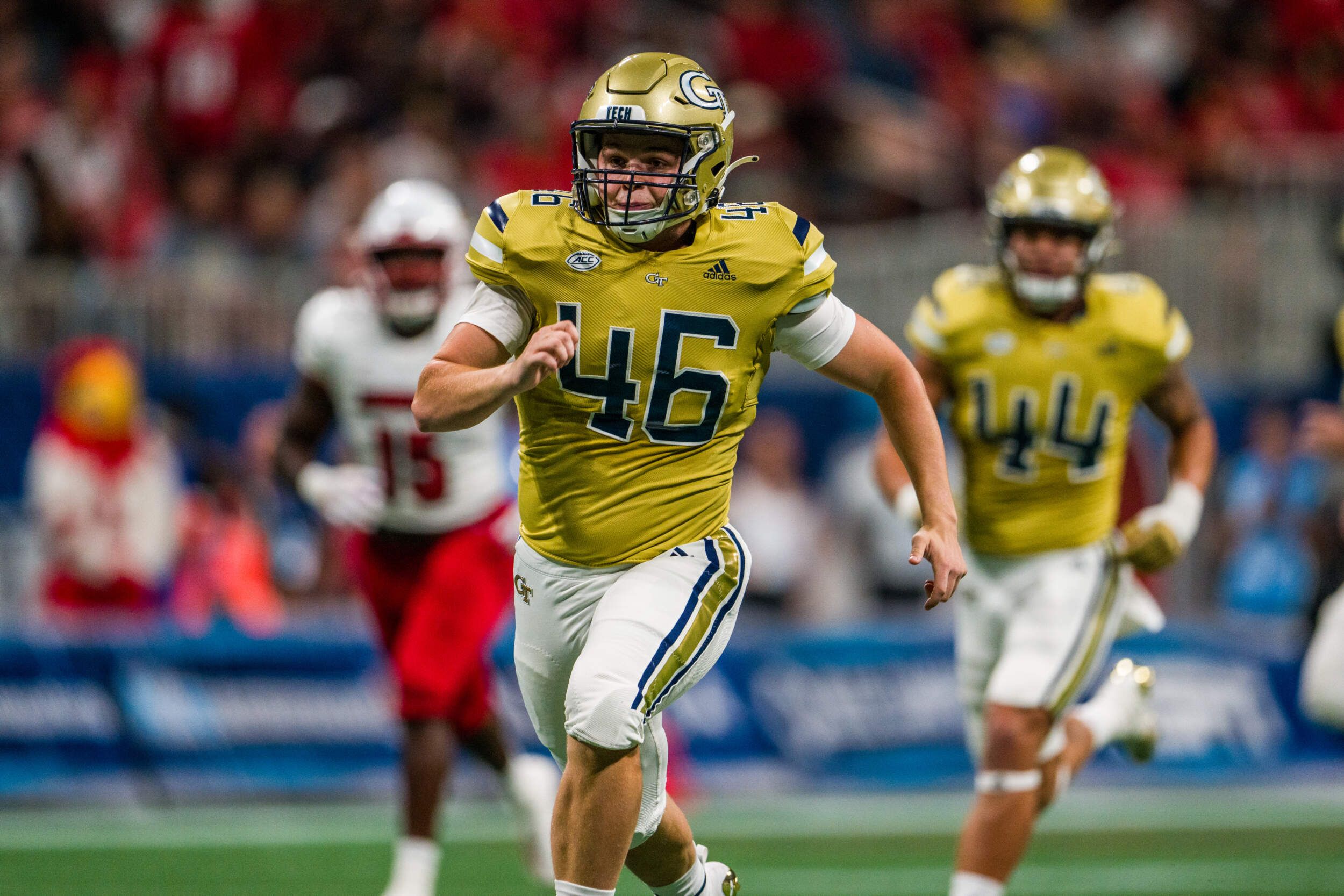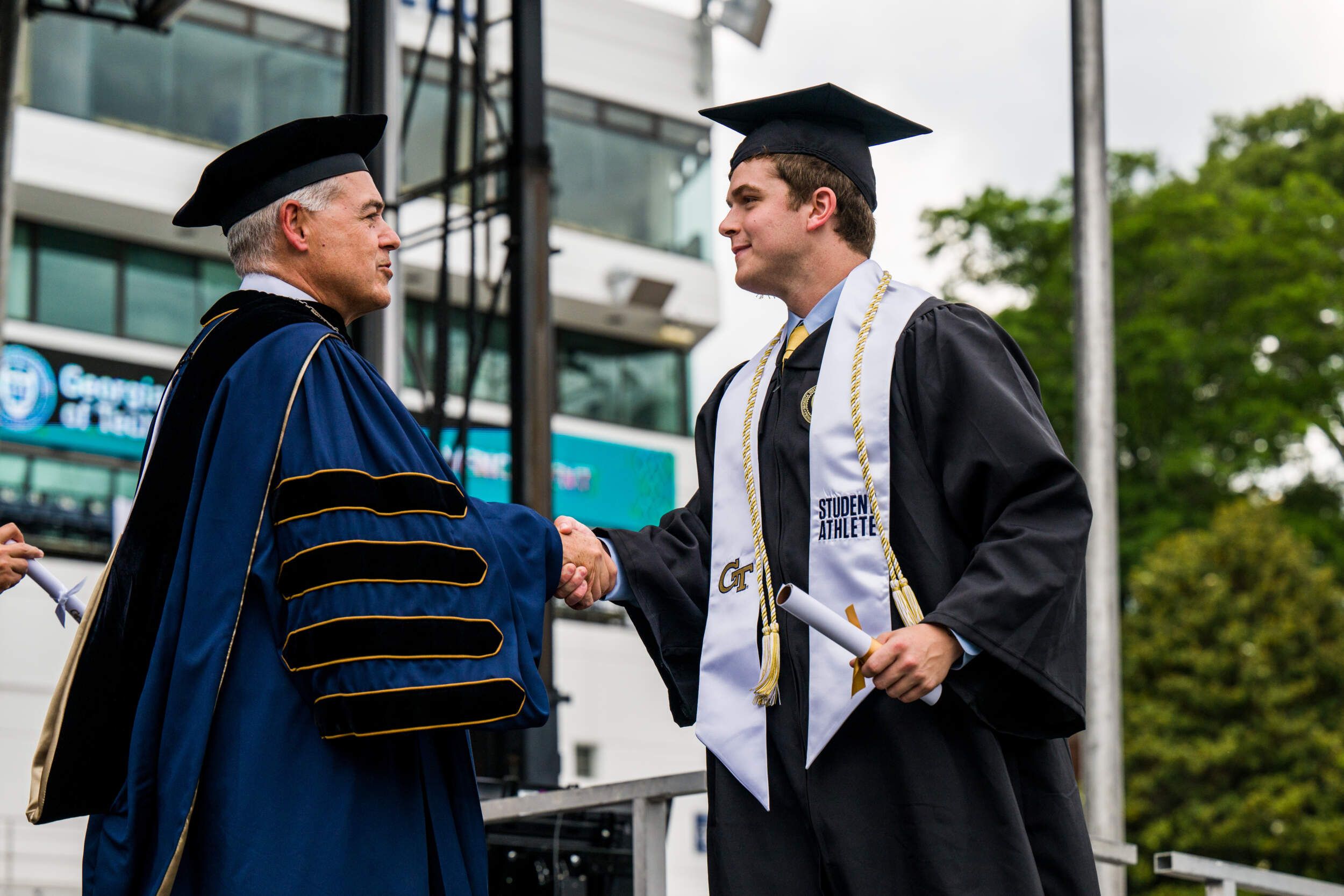Class Of His Own: Even at an elite engineering school like Georgia Tech, he’s doing something with no known precedent. Meet redshirt junior Henry Freer, just your average starting FBS long snapper … who’s also pursuing his Ph.D.
Inside The Chart | By Andy Demetra (The Voice of the Yellow Jackets)
Perhaps it comes with the territory, but playing long snapper involves a fair amount of humility and anonymity. Jog in, put your head down, rip a spiral back to the punter or holder, don’t cause any issues, jog off, and wait to do it again. There’s pressure in the position but rarely glory. Do your job perfectly and hardly anyone notices.
So perhaps it didn’t dawn on Henry Freer at first that he, the long snapper used to keeping a low profile, is doing something thought to be unprecedented in the history of Georgia Tech football – and in the hallowed history of Georgia Tech academics.
“It’s definitely an honor. It’s exactly what we do here at Tech. We do things people haven’t done before,” he said.
A native of College Park, Ga., the 6-foot, 205-pound Freer is currently in his second year as Georgia Tech’s starting snapper on punts and field goals. He’s also in his first year as a Ph.D. student in Georgia Tech’s School of Chemical & Biomolecular Engineering, having earned his bachelor’s degree in chemical and biomolecular engineering in May. He’s believed to be the first football student-athlete ever enrolled in a Ph.D. program at Tech while still an active player.
Forget NIL. Freer has three other letters he’s preoccupied with. And that pursuit has drawn no shortage of awe from his coaches.
“His level of intelligence is off the charts,” said head coach Brent Key.
“I never yell at him because he might be my boss one day,” added special teams coach Ricky Brumfield.
That line that’s come in vogue lately, where athletes refer to the practice field as “the lab”? Freer has an actual lab to go to. Like, right after this interview. He needs to learn how to make an electrolyser, which uses electricity to split water into hydrogen and oxygen, for use in future lab tests.
“The ones that do know are kind of like, ‘I know how hard this is. So how are you doing something else on top of this? And that’s kind of the reaction I get from coaches and teammates too,” Freer said.
Well, not all of them.
“He’s only a long snapper, so don’t give him too much credit,” quipped punter and place-kick holder David Shanahan.
His fellow special teamer quickly set his Irish wit aside. “The time commitment alone, I mean it’s crazy… and to do a full Ph.D. and be a starting Power-5 football player at a place like Georgia Tech is very, very impressive,” he clarified.
Freer didn’t initially have visions of long snapping, much less doing it in college. He first took up the job as a 160-pound sophomore at Woodward Academy, after the varsity’s starter quit the team. A member of the War Eagles’ back-to-back region championship teams, he was recruited to play football by smaller schools like Carnegie Mellon and MIT. He also had a couple conversations about walking on at Virginia, where Brumfield was serving as the Cavaliers’ special teams coach.
Freer instead took his 33 credit hours and 35 ACT score to his hometown school, ready to dive into his chemical engineering studies while hanging up his cleats for good.
“I liked math, I liked chemistry, I liked science, but I knew I wanted to be an engineer because I wanted to solve problems. I didn’t just want to think about things in a theoretical sense all day and never actually solve anyone’s problems. That’s what engineers do, and really that’s why I came to Tech,” said Freer, who notes that he doesn’t necessarily come from a family of left-brained thinkers: his dad taught history at Woodward, while his mom was an English teacher.
In May of his senior year, though, Georgia Tech’s coaches reached out to Freer about joining the team as a walk-on. He knew it’d create more stress and sacrifice, but ultimately he couldn’t pass up the opportunity to play again.
Long snapping doesn’t exactly lend itself to stats, but Brandon Pottebaum, Georgia Tech’s assistant athletics director for academic services, is more than happy to share Freer’s numbers in the classroom. He made the Dean’s List in five of his eight semesters as an undergrad, including Faculty Honors in three of them for earning a 4.0 GPA. As he settled in to Georgia Tech’s starting long snapper role in 2022, he was the second author on a published paper titled “Understanding the Role of Polymer Interactions within Binders in Composite Lithium-Ion Anodes.” He graduated with a 3.84 GPA, a wildly high number for a regular student, let alone someone who had the additional demands of playing a sport.
Oh, and Freer did it while also working part-time for Suwanee, Ga.-based Control Southern, helping write code for automated manufactured systems (walk-ons have to earn money, after all).
“There’s no sleep for this kid,” Pottebaum said. “It’s not just a difficult major. It’s constant. It’s every single course. It’s just a gauntlet.” He said Freer still occasionally asks him if any of his teammates are struggling in their math classes. Maybe, he suggests, he can explain the material in a more approachable way than a faculty member.
Pottebaum, who started working at Tech in 2013, can only recall one other football player who majored in chemical and biomolecular engineering while lettering all four years.
“Henry just killed it. He’s miles above even his non-student-athlete peers, to be able to pull a 3.84 in that program, from this place. It’s very, very rare,” he said.
Henry Freer walked across the stage to receive his bachelor’s degree from Georgia Tech President Ángel Cabrera in May.
Freer had two years of eligibility left when he walked across the graduation stage with highest honors in May. The demands of his major hadn’t deterred him from still wanting to play football while pursuing his Ph.D. In fact, he made it part of his application essay.
“You guys always say ‘We can do that.’ That’s the tag line. It’s time to put your money where your mouth is. I want to do both. I can do both. I’ve shown that I can do both,” he recalled writing.
Freer spent the beginning of his semester meeting with professors to get matched for an advisor – in the Ph.D. world, it’s something of a cross between a combine and an official visit. Students rank their top choices for an advisor, while professors do the same with their students.
Freer knew his desire to play football would turn off some professors, who might have concerns about his time commitment. Just like in recruiting, fit mattered.
“If I were talking with them about it, and they didn’t really understand what football was, that wasn’t going to be a good fit. I needed them to know I’m not just running around on the field with my friends while I should be in the lab. It’s serious. It’s a big deal,” he said.
He found a match in Dr. Paul Kohl, a Regents’ Professor and Institute Fellow who’s in his 34th year at Georgia Tech. Kohl is careful not to dote on Freer above his other Ph.D. students – just like his children, he loves them all equally – but he has always been supportive of his students’ extracurricular interests, whether it’s music or art or football.
Even with the demands on his time, he knew Freer’s football career would be an asset more than a hindrance.
“What you get out of that is excellent, and sometimes it’s irreplaceable. In Henry’s case, I think you see dedication. You see commitment. I think particularly in athletics and in music, you get learnings along the lines of persistence and commitment to a cause,” Dr. Kohl said. He compared the repetition of long snapping, practicing his technique hundreds of times in preparation for those few critical moments during a game, to the necessary tedium Ph.D. students experience in their research or lab tests.
Not every student has the temperament for that, Dr. Kohl says. He’s confident Freer does.
“I think it is a once-in-a…..,” he said.
He stopped to consider how to express himself.
“I’ve never seen anyone do this – and so it’s the hardest combination you could pick up. The Ph.D. in a very demanding discipline, while also being an athlete,” Kohl said.
And so Freer’s Ph.D. journey has begun this semester, taking courses in lightweight subjects like Mass Transport 3 and Mathematical Modeling For Chemical Process while logging several hours a week in the lab. He’s praised his coaches and professors for accommodating his schedule – there are days when he has to miss practice or a special teams meeting to attend lab or a class, or vice-versa. Usually first-year Ph.D. students take four courses in the fall; they’ve allowed Freer to take two. His weekends are still filled with travel, games and recovery, which makes maximizing time a necessity.
Shanahan says he and placekicker Gavin Stewart like to pop in to Freer and kicker Aidan Birr’s hotel room the night before games.
“We’ll mess with Henry to take our nerves away. Henry will be writing some crazy algorithm on his laptop, or some ridiculous equation. We’ll poke fun at him or whatever, but then we’ll ask him to explain it and he’s speaking a different language, really,” said Shanahan, shaking his head.
It begs the question: is football the stress relief from his Ph.D. work, or is Ph.D. work the stress relief from football?
“Football is probably less stressful most of the time, but sometimes it’s good to get away from football. It’s all about balance,” Freer said.
A public policy minor, Freer said he was drawn to Dr. Kohl’s work in green hydrogen production and the ways it can become an alternative to fossil fuels. Green hydrogen, Kohl explained, has the potential to revolutionize industries like steel making, cement making and fertilizer production, which can help solve food inequality issues around the world.
Freer is excited to help advance that research. “The professors at Tech are always talking about [how] it’s the greatest challenge of our generation, figuring out how we can reach carbon neutral. Lots of professors at Tech, that’s one of their career goals. I just think being kind of being a small piece of that big puzzle that we’re undergoing as a human race, that’s kind of what I want to do,” he said.
The Ph.D. program in chemical and biomolecular engineering at Georgia Tech usually takes anywhere from four to six years to complete. Freer acknowledges he’s still in his “freshman year” as a Ph.D. student. The workload will intensify next semester, when he expects to log anywhere from 20 to 40 hours a week in the lab on top of taking two more courses.
For as exhausting as the last four years have been, few would fault Freer if he wanted to concentrate solely on his Ph.D. work. There are only so many hours in a day, only so much stress one person can bear. At a certain point, an engineer has to recalculate the value proposition of a project.
Not Freer. He still has a year of eligibility left due to Covid-19. And he’s already decided he has more long snapping in him.
“That’s the intention,” he said of playing next season.
Even if it means dealing with another hazard of being the first known Tech football player to be chasing his Ph.D.
Said Freer, smiling: “You definitely don’t want to be answering any questions wrong in a meeting.”











